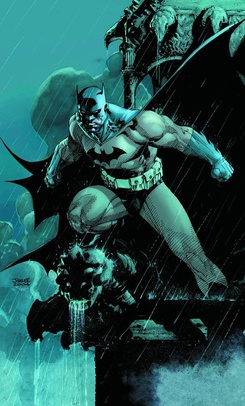
Batman is a superhero appearing in American comic books published by DC Comics. The character was created by artist Bob Kane and writer Bill Finger, and debuted in the 27th issue of the comic book Detective Comics on March 30, 1939. In the DC Universe continuity, Batman is the alias of Bruce Wayne, a wealthy American playboy, philanthropist, and industrialist who resides in Gotham City. Batman's origin story features him swearing vengeance against criminals after witnessing the murder of his parents Thomas and Martha as a child, a vendetta tempered with the ideal of justice. He trains himself physically and intellectually, crafts a bat-inspired persona, and monitors the Gotham streets at night. Kane, Finger, and other creators accompanied Batman with supporting characters, including his sidekicks Robin and Batgirl; allies Alfred Pennyworth, James Gordon, and Catwoman; and foes such as the Penguin, the Riddler, Two-Face, and his archenemy, the Joker.

Benjamin Charles Elton is a British comedian, actor, author, playwright, lyricist and director. He was a part of London's alternative comedy movement of the 1980s and became a writer on the sitcoms The Young Ones and Blackadder, as well as continuing as a stand-up comedian on stage and television. His style in the 1980s was left-wing political satire. Since then he has published 17 novels and written the musicals The Beautiful Game (2000), We Will Rock You (2002), Tonight's the Night (2003), and Love Never Dies (2010), the sequel to The Phantom of the Opera. His novels cover the dystopian, comedy, and crime genres.
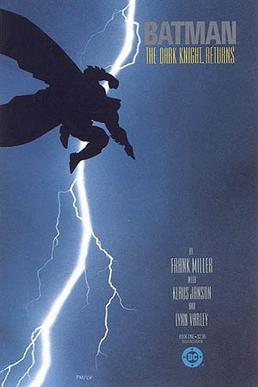
The Dark Knight Returns is a 1986 four-issue comic book miniseries starring Batman, written by Frank Miller, illustrated by Miller and Klaus Janson, with color by Lynn Varley, and published by DC Comics. It tells an alternative story of Bruce Wayne, who at 55 years old returns from retirement to fight crime and faces opposition from the Gotham City police force and the United States government. The story also features the return of classic foes such as Two-Face and the Joker, and culminates with a confrontation with Superman, who is now a pawn of the government.
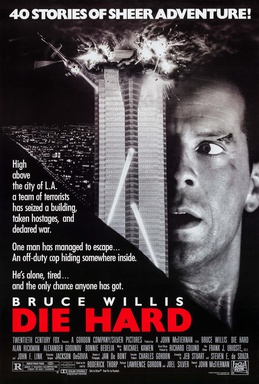
Die Hard is a 1988 American action film directed by John McTiernan and written by Jeb Stuart and Steven E. de Souza, based on the 1979 novel Nothing Lasts Forever by Roderick Thorp. It stars Bruce Willis, Alan Rickman, Alexander Godunov, and Bonnie Bedelia, with Reginald VelJohnson, William Atherton, Paul Gleason, and Hart Bochner in supporting roles. Die Hard follows New York City police detective John McClane (Willis) who is caught up in a terrorist takeover of a Los Angeles skyscraper while visiting his estranged wife.

Richard Earl Thomas is an American actor. He is best known for his leading role as budding author John-Boy Walton in the CBS drama series The Waltons for which he won an Emmy Award. He also received another Emmy nomination and two Golden Globe Award nominations, for that role.
Popcorn, or pop corn, is a variety of corn kernel, which forcefully expands and puffs up when heated.
Victoria Vale is a fictional character appearing in American comic books published by DC Comics, commonly in association with the superhero Batman. Created by Bob Kane and Bill Finger, the character debuted in Batman #49. Vicki Vale is a journalist, usually based in Gotham City, who has worked for a number of publications across various iterations of the character and the surrounding DC universe. She is frequently depicted as a romantic interest of Bruce Wayne, the alter-ego of Batman.

Batman: Dark Victory is a 14-part American comic book limited series published by DC Comics, featuring the superhero Batman. The series, which ran from 1999 until 2000, was written by Jeph Loeb and drawn by Tim Sale, and it serves as a sequel to Batman: The Long Halloween. Batman: Dark Victory takes place primarily four to five years into Batman's career as a vigilante crimefighter. The plot centers on a series of murders involving Gotham City police officers by a mysterious serial killer only known as the Hangman. Central to the storyline is a territory war between Two-Face and the remnants of the Falcone mob, led by Sofia Falcone.

Nothing Lasts Forever is a 1979 action thriller novel by American author Roderick Thorp, a sequel to his 1966 novel The Detective. The novel is mostly known through its 1988 film adaptation Die Hard, starring Bruce Willis. In 2012, the book was brought back into print and released as an ebook for the 24th anniversary of the film.

Stark is a 1989 novel by comedian Ben Elton. It was commercially and critically successful in the United Kingdom and Australia. It was Elton's first novel, and launched his writing career. Stark was reprinted 23 times in its first year, and ultimately sold well over a million copies, making Elton one of a small number of novelists to sell more than a million copies of their first book. The novel was adapted into Stark, a television miniseries.

Ben Daniels is a British actor. Initially a stage actor, Daniels was nominated for an Olivier Award for Best Supporting Actor for Never the Sinner (1991), the Evening Standard Award for Best Actor for 900 Oneonta (1994), Best Actor in the M.E.N. Theatre Awards for Martin Yesterday (1998), and won the 2001 Olivier Award for Best Supporting Actor for his performance in the Arthur Miller play All My Sons.
"Gender Education" is an episode of the British comedy television series The Goodies. Written by The Goodies, with songs and music by Bill Oddie.
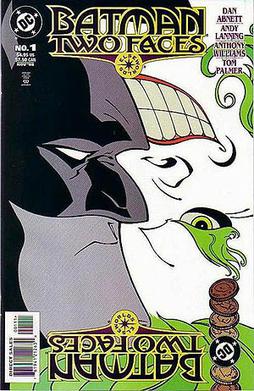
Batman: Two Faces is a DC Comics Elseworlds comic book, published in 1998. Written by Dan Abnett and Andy Lanning, with art by Anthony Williams and Tom Palmer, the story is based on the novel Strange Case of Dr. Jekyll and Mr. Hyde by Robert Louis Stevenson. A Victorian-era Bruce Wayne tries to purge both his own evil side and that of Two-Face, while a serial killer named the Joker roams the streets. A sequel, The Superman Monster, was published in October the following year.
The fictional superhero Batman, who appears in American comic books published by DC Comics, has appeared in various films since his inception. Created by Bob Kane and Bill Finger, the character first starred in two serial films in the 1940s: Batman and Batman and Robin. The character also appeared in the 1966 film Batman, which was a feature film adaptation of the 1960s Batman TV series starring Adam West and Burt Ward, who also starred in the film. Toward the end of the 1980s, the Warner Bros. studio began producing a series of feature films starring Batman, beginning with the 1989 film Batman, directed by Tim Burton and starring Michael Keaton. Burton and Keaton returned for the 1992 sequel Batman Returns, and in 1995, Joel Schumacher directed Batman Forever with Val Kilmer as Batman. Schumacher also directed the 1997 sequel Batman & Robin, which starred George Clooney. Batman & Robin was poorly received by both critics and fans, leading to the cancellation of Batman Unchained.

The Untold Legend of the Batman is a three-issue Batman comic book miniseries published by DC Comics in 1980. It was written by Len Wein. The first issue was penciled by John Byrne and inked by Jim Aparo. The second and third issues were drawn entirely by Aparo. José Luis García-López drew the covers for the entire series. The primary plot elements of the story are retellings of the origins of several Batman characters. It is the second miniseries published by DC Comics as well as the first starring Batman.
Daniel Abineri is an English songwriter, actor, director, narrator and playwright known for writing the book, music and lyrics for the controversial rock musical Bad Boy Johnny and the Prophets of Doom. The 1994 London production made national news when it caused grave offence to the Roman Catholic Church and was closed down after just nine performances.
Edward I of England has been portrayed in popular culture a number of times.

Blaxploitation is an ethnic subgenre of the exploitation film that emerged in the United States during the early 1970s. The term, a portmanteau of the words "black" and "exploitation", was coined in August 1972 by Junius Griffin, the president of the Beverly Hills-Hollywood NAACP branch. He claimed the genre was "proliferating offenses" to the black community in its perpetuation of stereotypes often involved in crime. The genre does rank among the first after the race films in the 1940s and 1960s in which black characters and communities are the protagonists and subjects of film and television, rather than sidekicks, antagonists or victims of brutality. The genre's inception coincides with the rethinking of race relations in the 1970s.
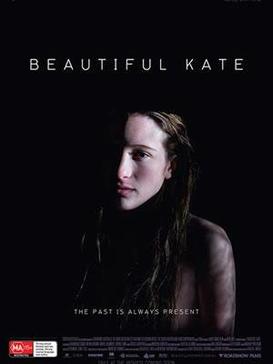
Beautiful Kate is a 2009 Australian drama film directed by Rachel Ward and starring Ben Mendelsohn, Rachel Griffiths, Bryan Brown, Maeve Dermody and Sophie Lowe. Ward adapted the script from a 1982 novel of the same name by Newton Thornburg; this was the first novel by Thornburg used for a movie since Cutter's Way (1981). The film was shot on location in the Flinders Ranges.

Bruce Wayne, also known by his superhero vigilante alias Batman, is a fictional character in the DC Extended Universe (DCEU), based on the DC Comics character of the same name. The character was portrayed by Ben Affleck in Zack Snyder's 2016 superhero film Batman v Superman: Dawn of Justice, the 2017 film Justice League, and a cameo appearance in Suicide Squad (2016). He will reprise the role in the upcoming films The Flash (2023) and Aquaman and the Lost Kingdom (2023). Fans nicknamed this iteration of the character "Batfleck", a portmanteau of "Batman" and "Affleck". In the films' universe, Bruce had already been active as Batman for twenty years before the emergence of Superman, and despite being initially at odds with him to the point of paranoia and anger, Batman comes to appreciate the former, starting the Justice League in his honor after Superman's sacrifice to stop Doomsday. The Justice League, under Wayne's leadership, fights to prevent Steppenwolf from collecting the three Mother Boxes and destroying Earth alongside his master Darkseid, eventually resurrecting Superman to aid in their collective efforts.














